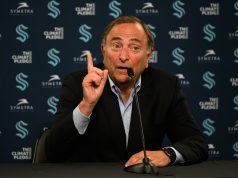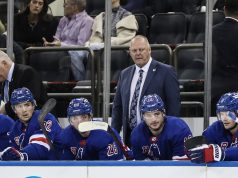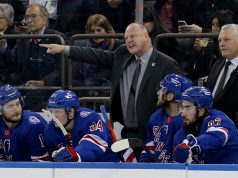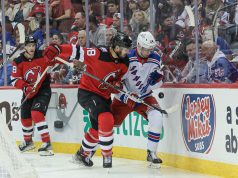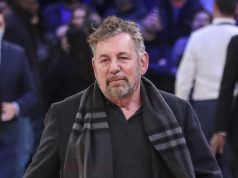With a little less than a month until the NHL trade deadline, it’s time to take a look at the New York Rangers’ complicated situation.
With 34 games remaining in the New York Rangers’ 2019-2020 campaign, the Blueshirts sit 10 points out of a playoff position. While everyone around the organization continues to preach the far-fetched idea that the Rangers are focused on qualifying for the Stanley Cup Playoffs, make no mistake: They will be sellers at the trade deadline.
Jeff Gorton and John Davidson find themselves in a very difficult spot this year. There are plenty of decisions to be made, all of which will have both long and short term impacts on the franchise.
Chris Kreider and Jesper Fast are set to hit unrestricted free agency this summer, while Tony DeAngelo, Ryan Strome, Brendan Lemieux and Alexandar Georgiev will become restricted free agents. These are core pieces of the Rangers squads of the present and future. This is what makes these decisions so difficult.
In conducting what would be a third straight trade deadline sell-off, the Blueshirts would most likely end up alleviating future problems while extending the rebuild in turn. For example, signing Chris Kreider to a six-year, $7 million extension would be beneficial to the team’s success for the next year or two. However, once Kreider’s play begins to decline and it becomes time to extend guys like Kaapo Kakko, Adam Fox and Igor Shesterkin, this contract is rendered a burden.
When deciding how to approach this year’s deadline, it’s crucial that Davidson and Gorton prioritize the team’s future success over their immediate success. By trading their assets, the Rangers will be taking a step back in order to take a step forward in the future.
Heading into February’s deadline, one thing is very clear: The Rangers won’t be buyers. Despite this, there are still questions about what exactly the intentions of the front office are. Will the Blueshirts be sellers or will they oversee a sell-off? There’s a difference.
At this point in time, the obvious deadline departures seem to be Chris Kreider and Alexandar Georgiev.
In regards to Kreider, the aforementioned contract that he will command this summer will be too far outside of New York’s price range. Considering this alongside the fact that the Rangers are not legitimate contenders, it would be foolish not to deal Kreider for what should be a quite hefty return.
In terms of Georgiev, there is simply no room for him on Broadway. While he should be a quality starting goaltender, it looks like Igor Shesterkin is ahead of him on the organizational depth chart, and Henrik Lundqvist isn’t going anywhere. For this reason, it makes sense for the Rangers to trade Georgiev to the highest bidder in February so that they can use the rest of this season to allow “Prince Igor” to gain some NHL experience.
Here’s where it gets complicated.
It’s difficult to say what the plan will be when it comes to Jesper Fast. While the 28-year-old is a valuable leader who could be re-signed to a relatively cheap contract, it is quite possible that the Rangers receive an offer that they cannot pass up. A defensive-minded forward with lots of experience, a low cap-hit, and some depth-scoring ability, could be an attractive commodity to a playoff team.

The same is true for a guy like Tony DeAngelo. He’s due for a massive raise this summer, as he has established himself as one of the league’s top offensive-defenseman. It may not make sense for the Blueshirts to pay DeAngelo the money he has earned when considering the fact that he’d be third on the depth chart when it comes to the Rangers’ right-handed defensemen. DeAngelo would be a terrific addition to a contending team that is looking for more offense from its blue-line.
Perhaps the most complicated situation of them all revolves around Ryan Strome. The 26-year-old is in the midst of a career, and his also helping his running mate, Artemi Panarin, to achieve the same feat. Strome would be a somewhat risky investment, but for an organization that lacks high-end prospects down the middle outside of Filip Chytil, it may make sense to extend Strome. His chemistry with the Breadman is undeniable.
That leaves Brendan Lemieux, whom the Blueshirts should look to lock up for the future. The grit and toughness that Lemieux brings to New York’s lineup is unmatched by few around the league. It would be silly not to try and sign Lemieux to a cheap, long-term deal this summer.
While the Rangers could go in lots of different directions leading up to February’s trade deadline, it’s not hard to envision them only parting with Kreider and Georgiev, and looking to extend their other pending free agents. This would be difficult, but certainly doable.
The final option that the Blueshirts could explore is using the trade deadline as a way to clear cap space for the players they’re interested in re-signing. Could the Rangers look to deal guys like Pavel Buchnevich or Brady Skjei? I don’t expect this to happen, but it’s not out of the realm of possibility.
The next month should be very interesting, and it will tell us a lot about the Blueshirts’ plans for the future. Don’t expect another full-on sell-off, but don’t expect the Rangers to stand pat and try to make a playoff run either.
The rebuild isn’t over yet.





